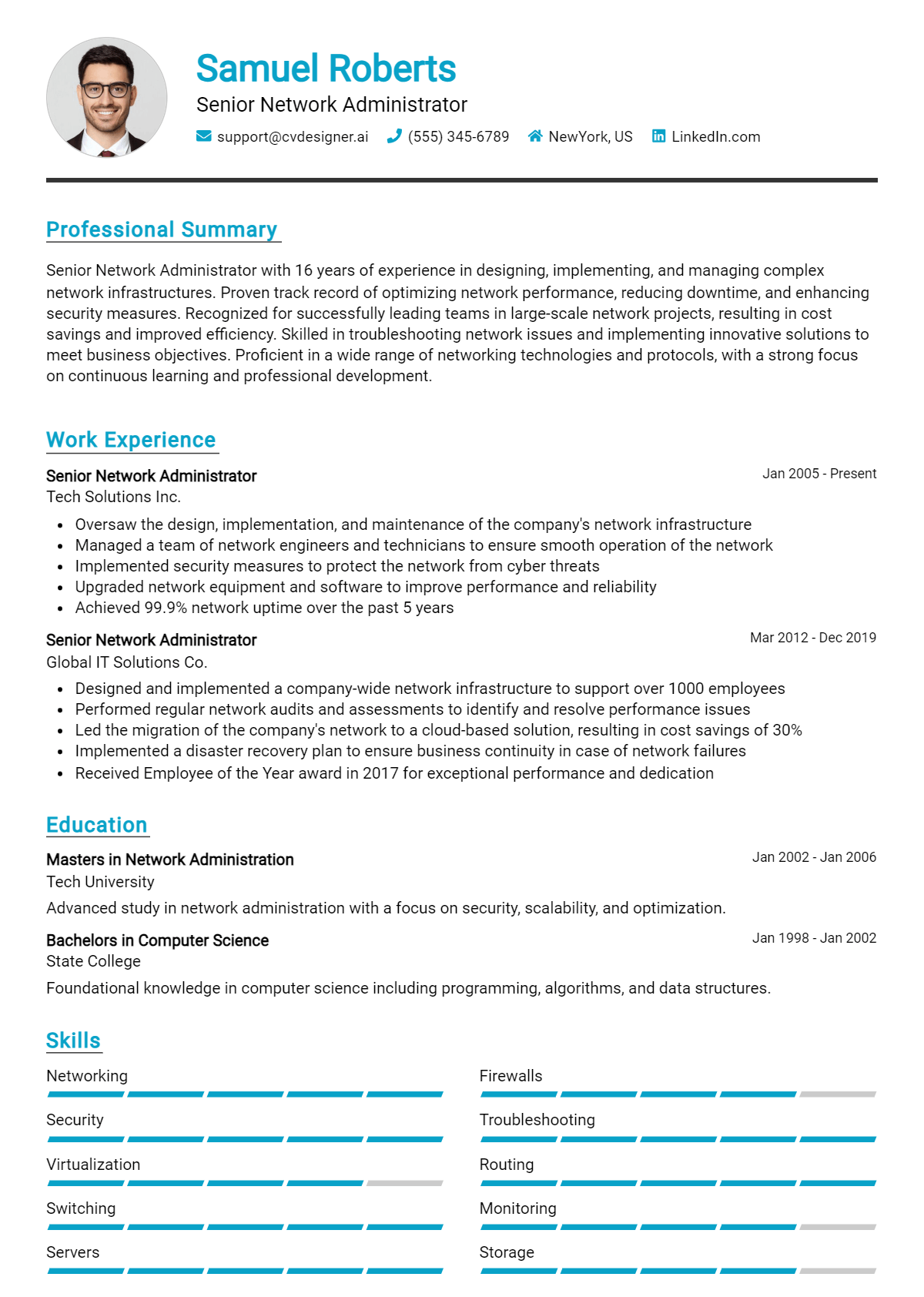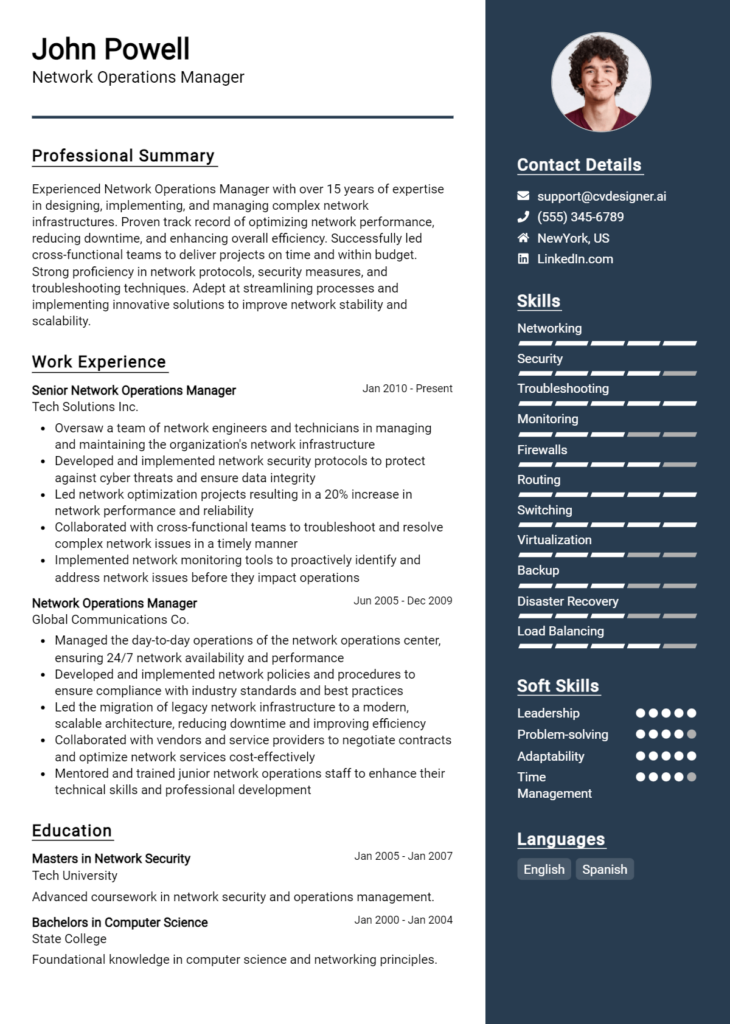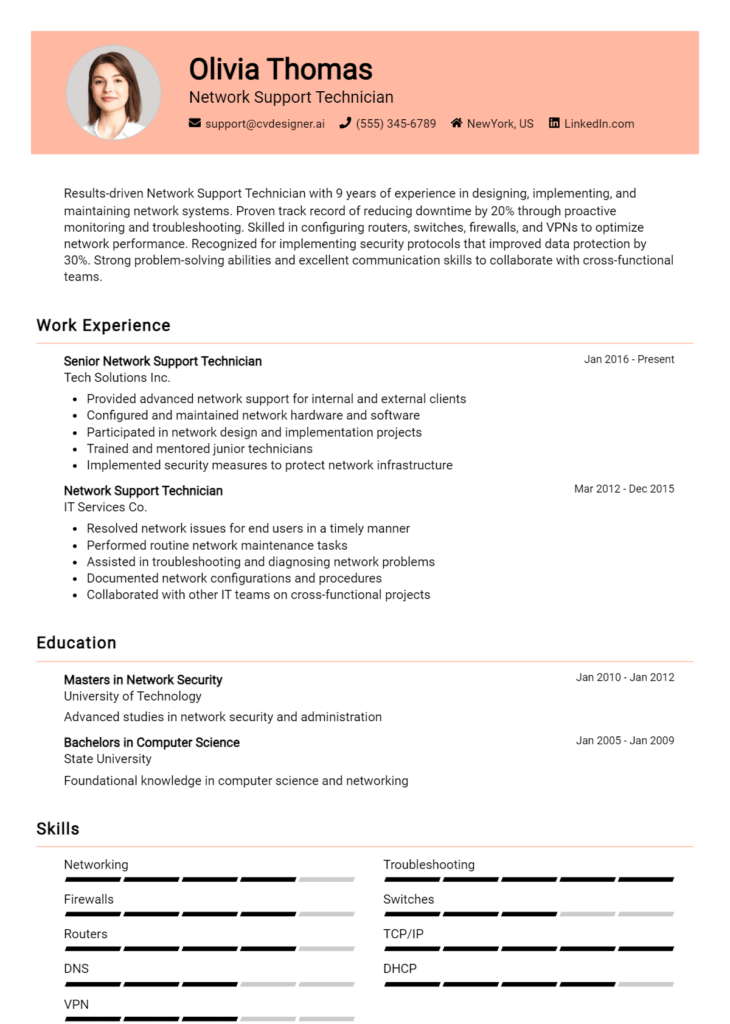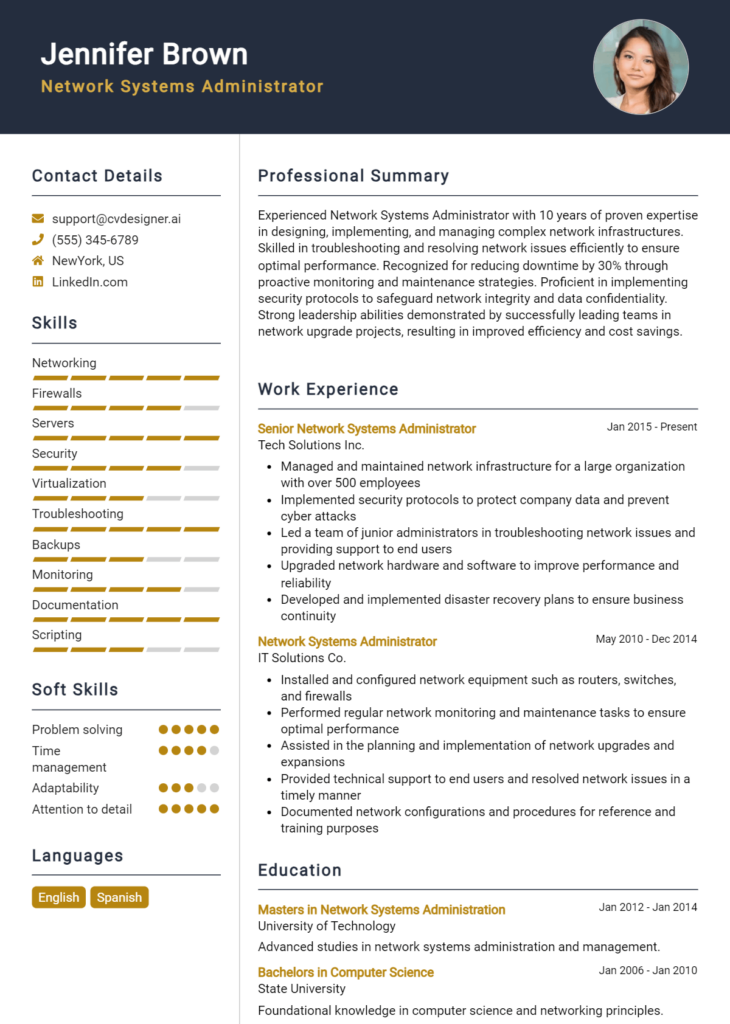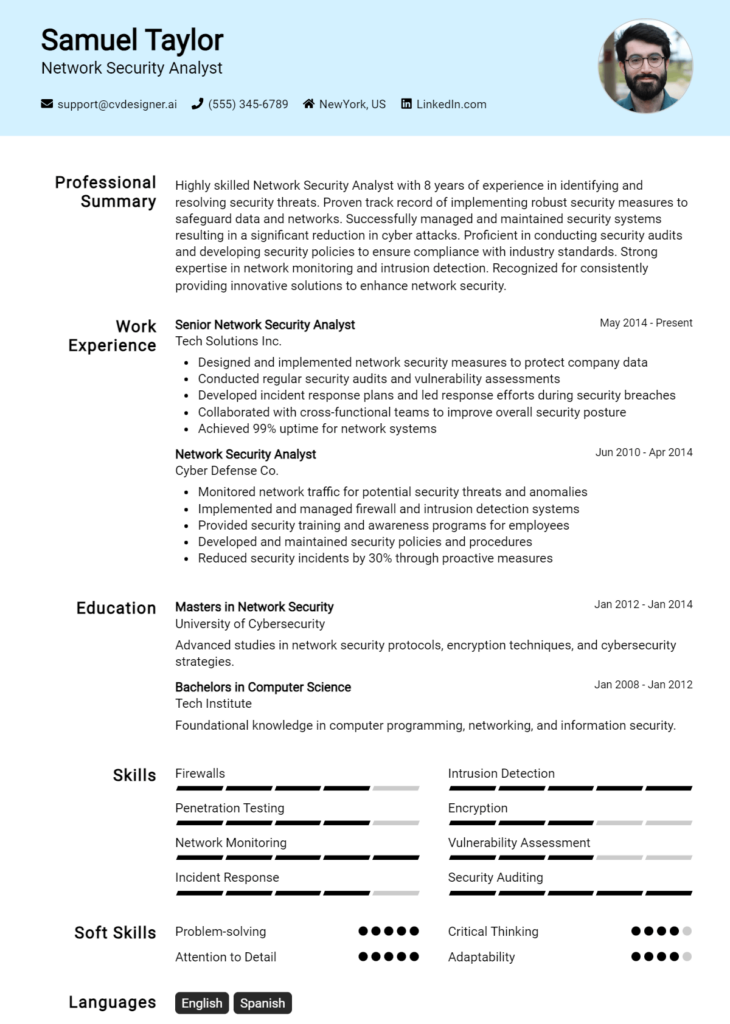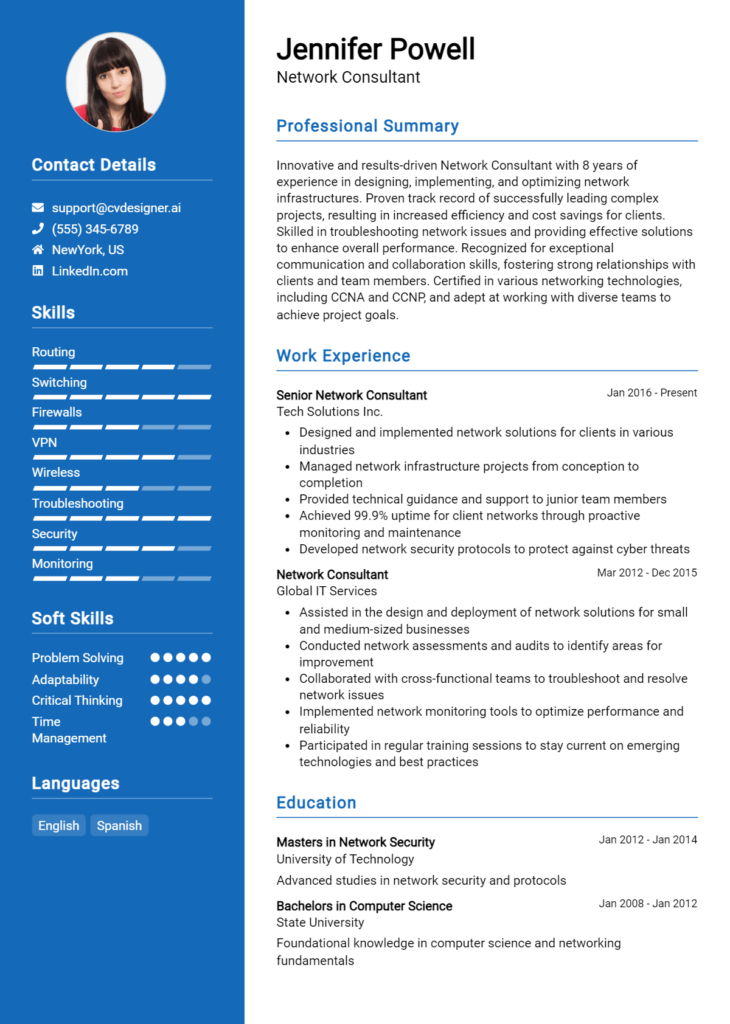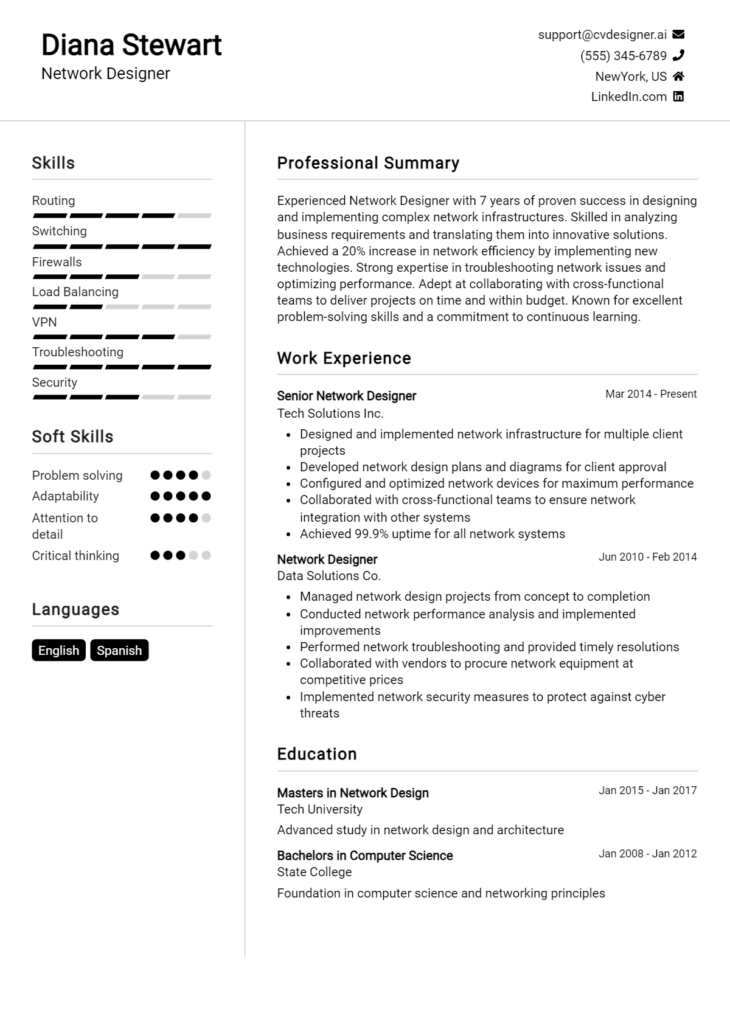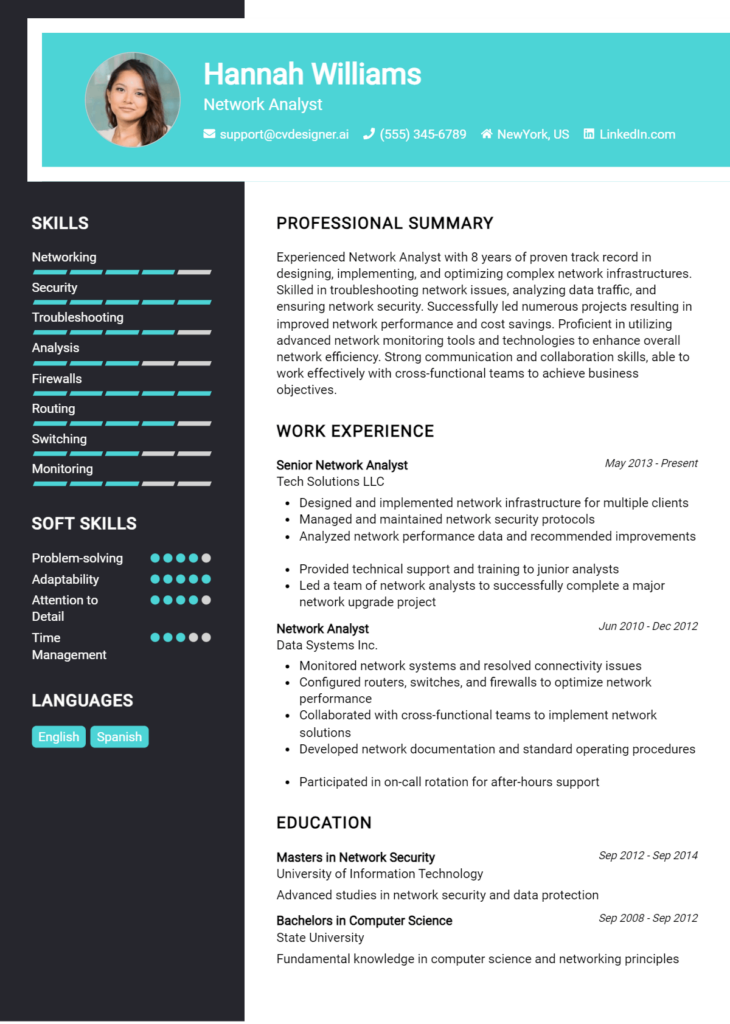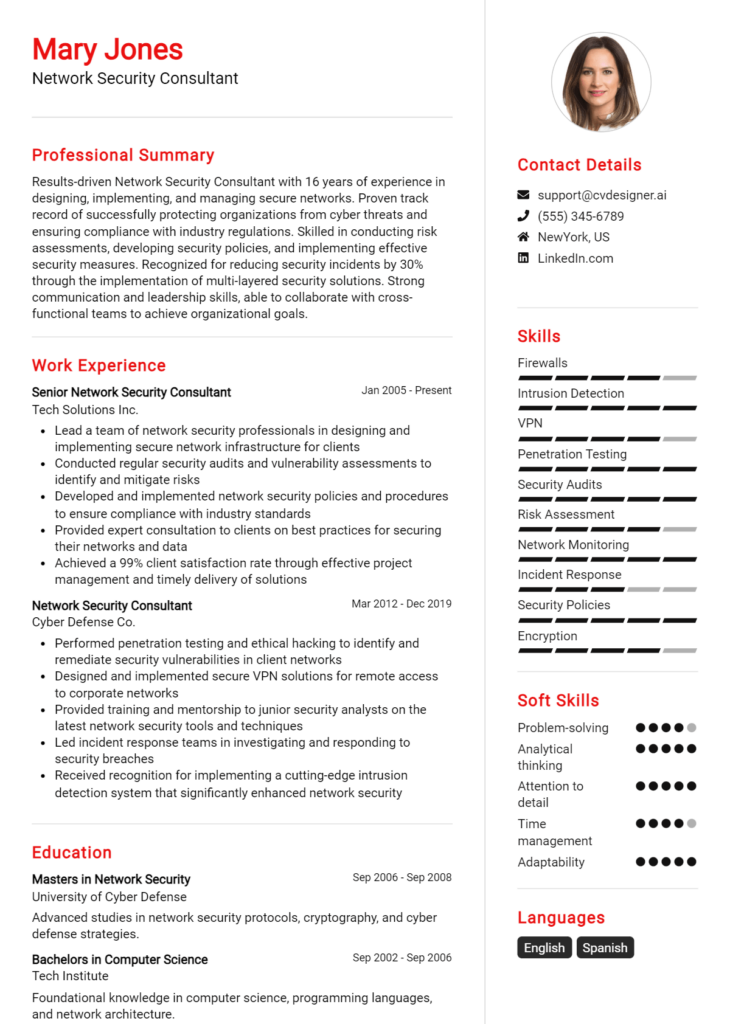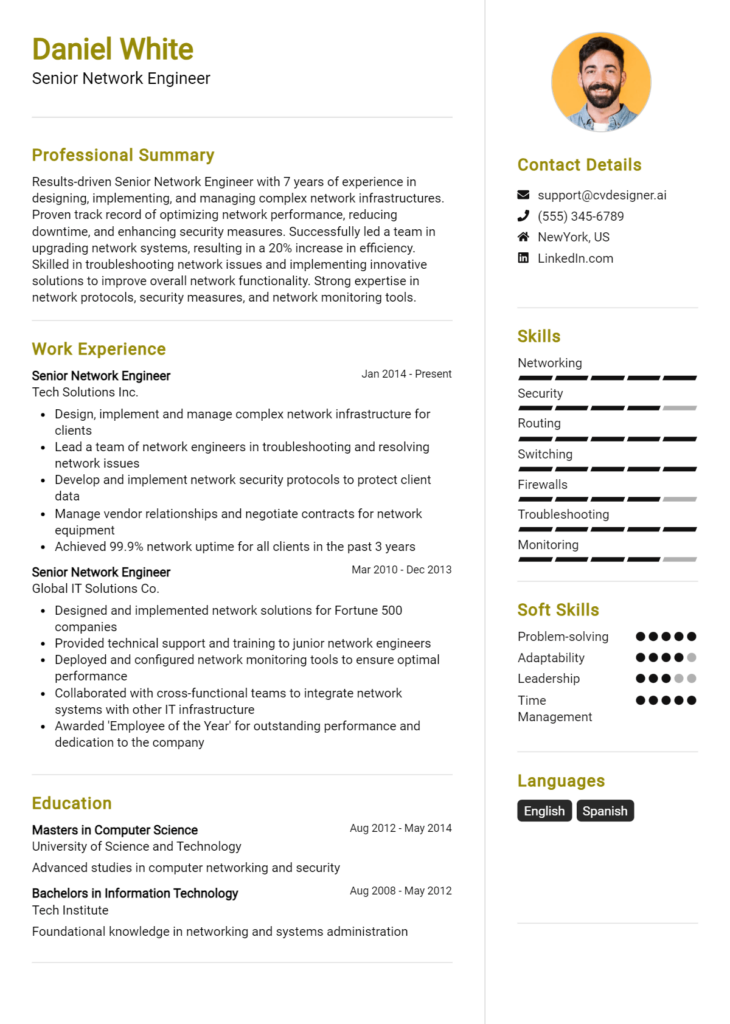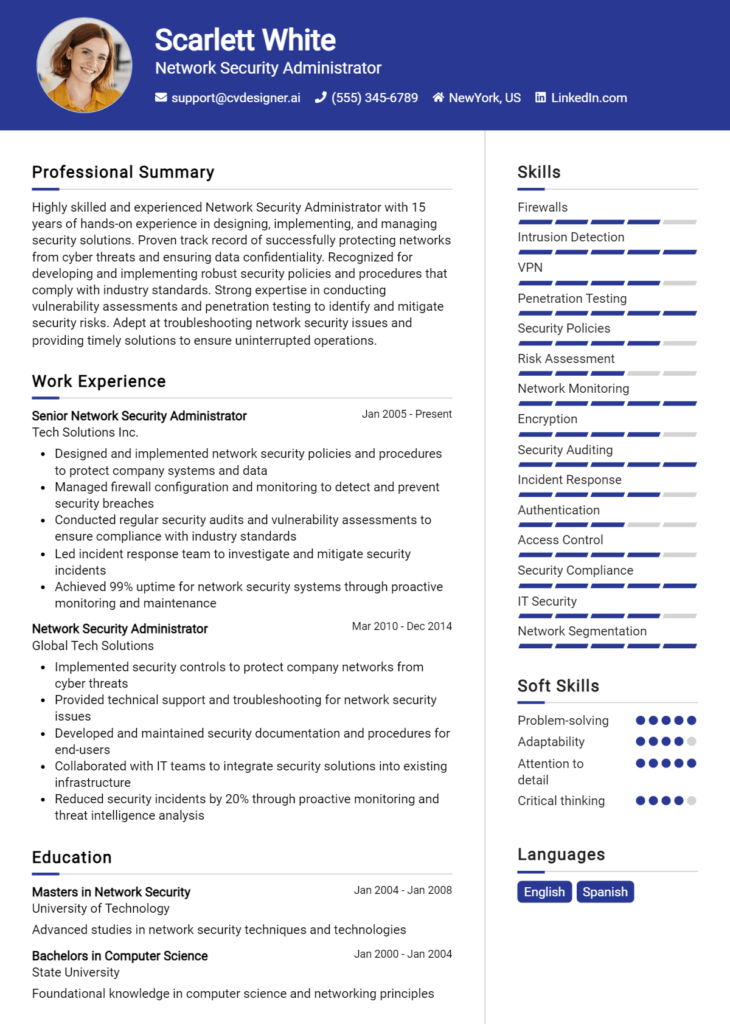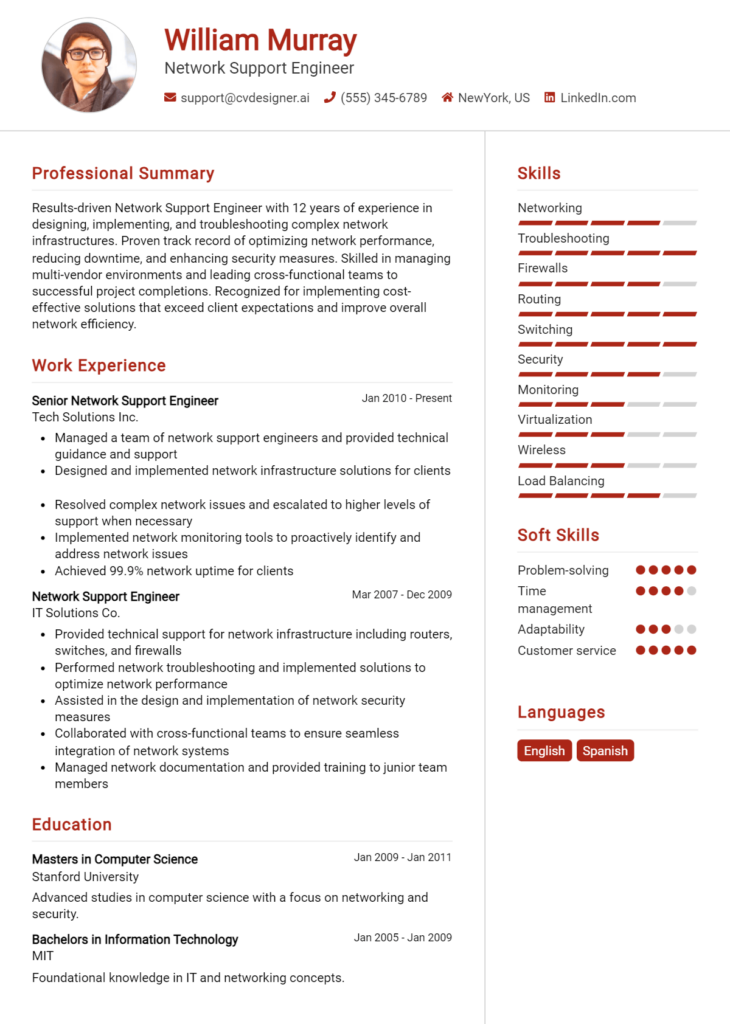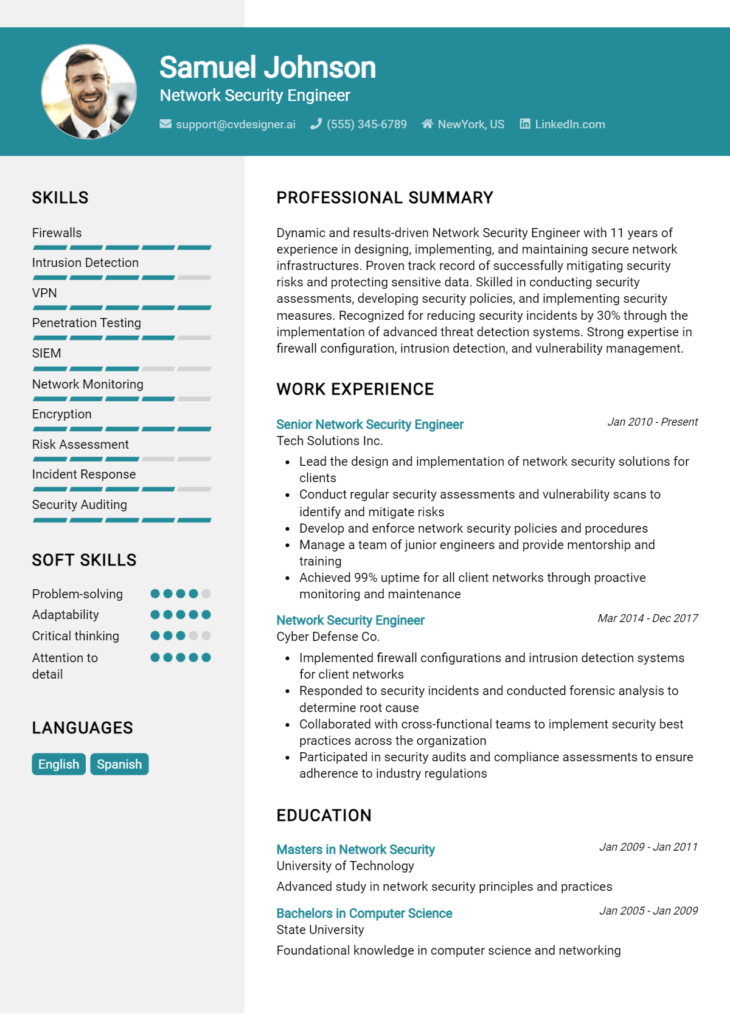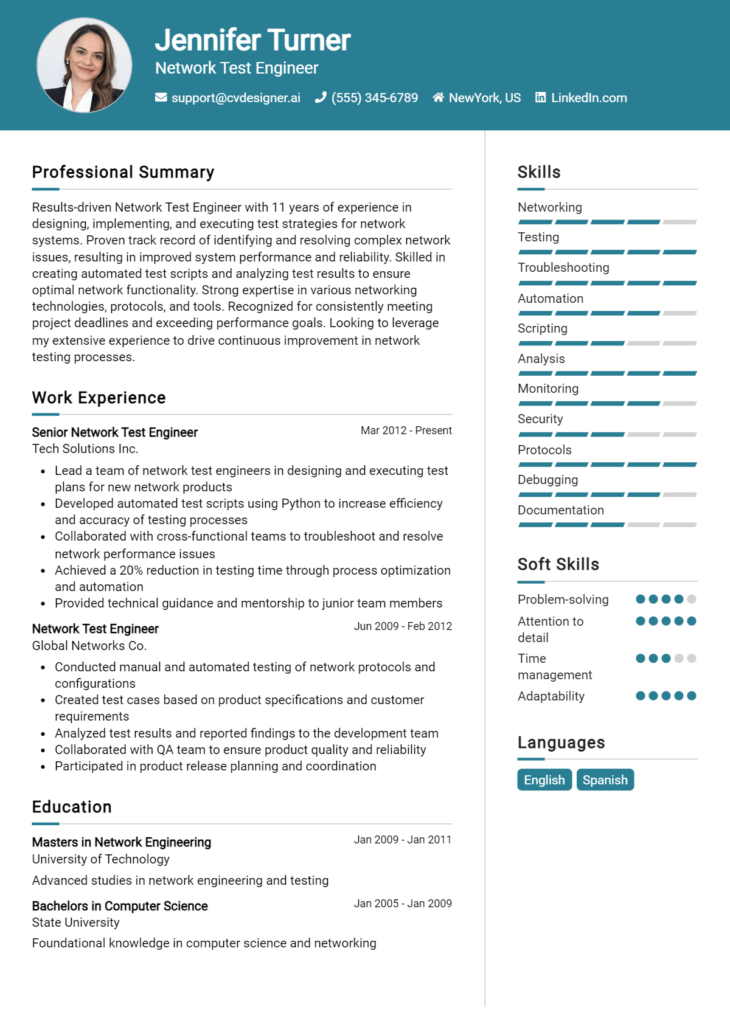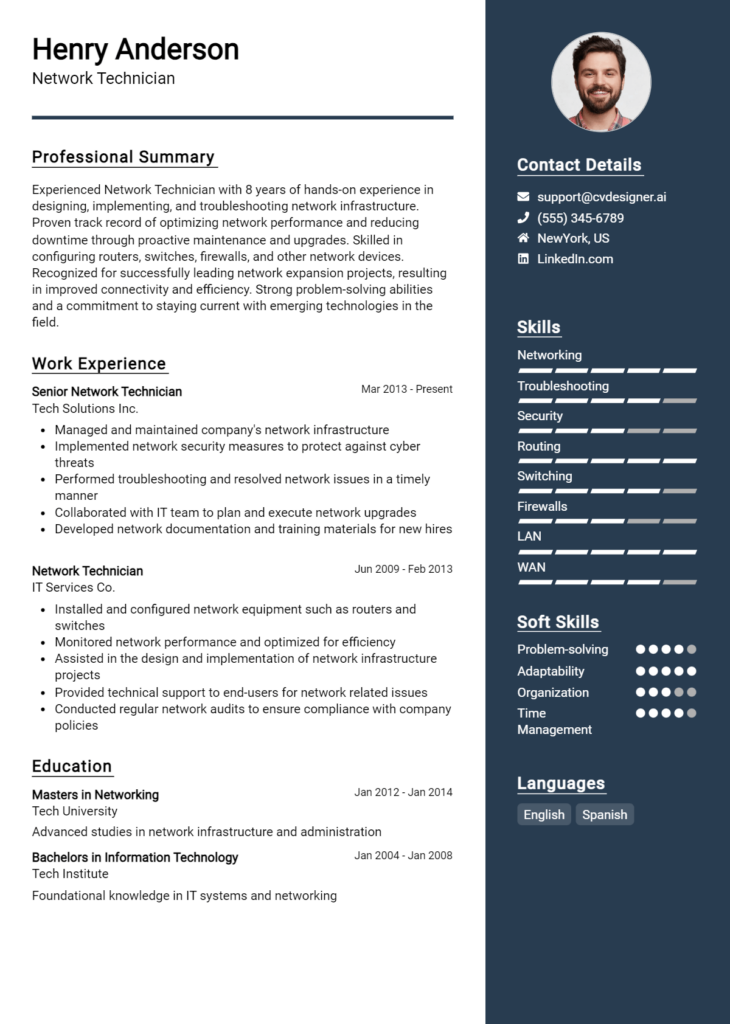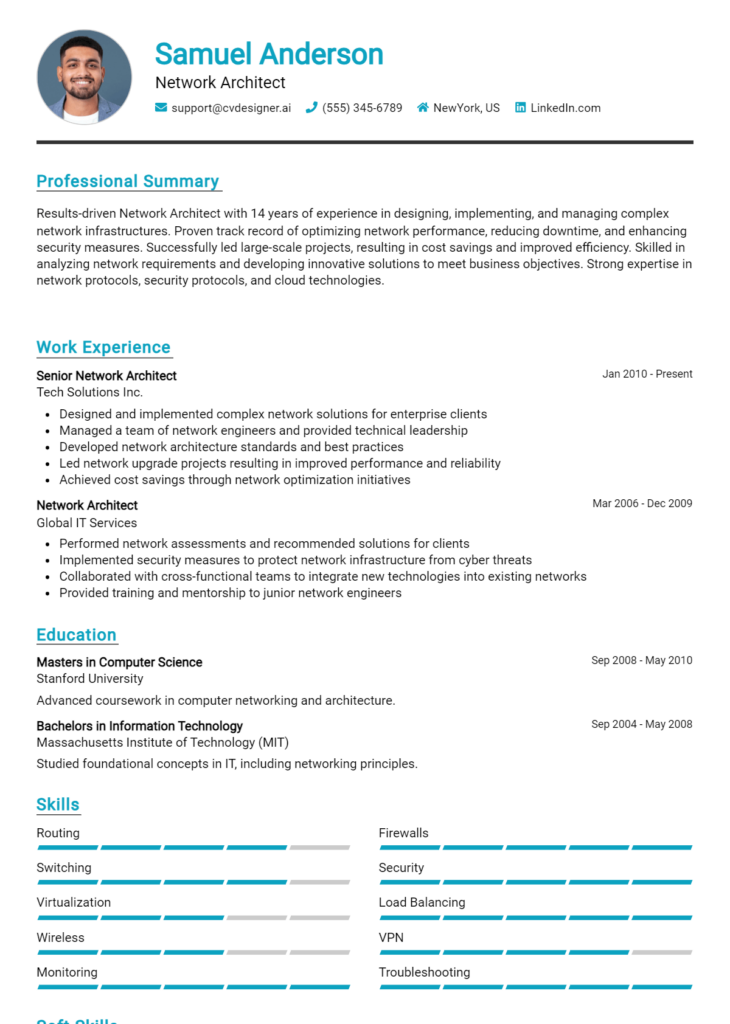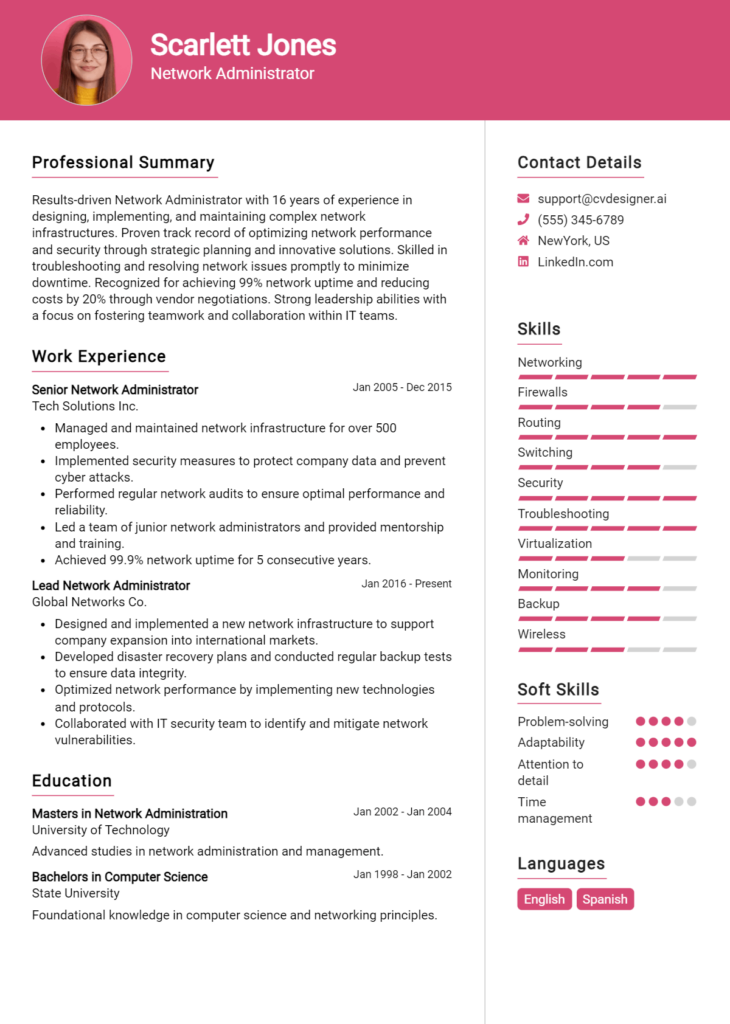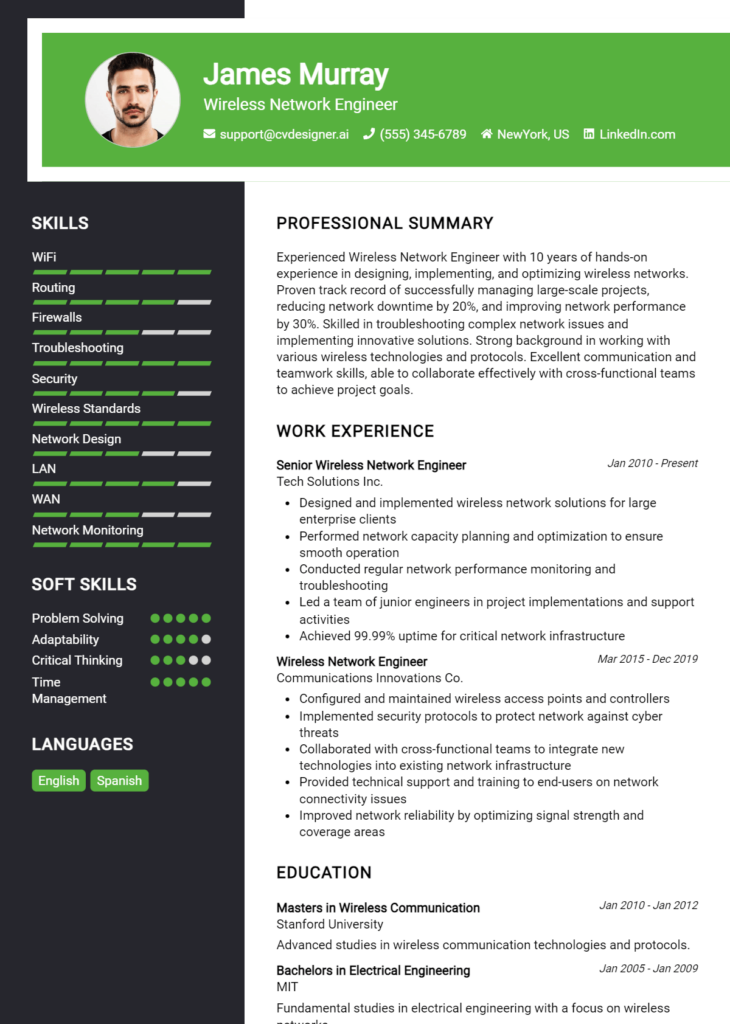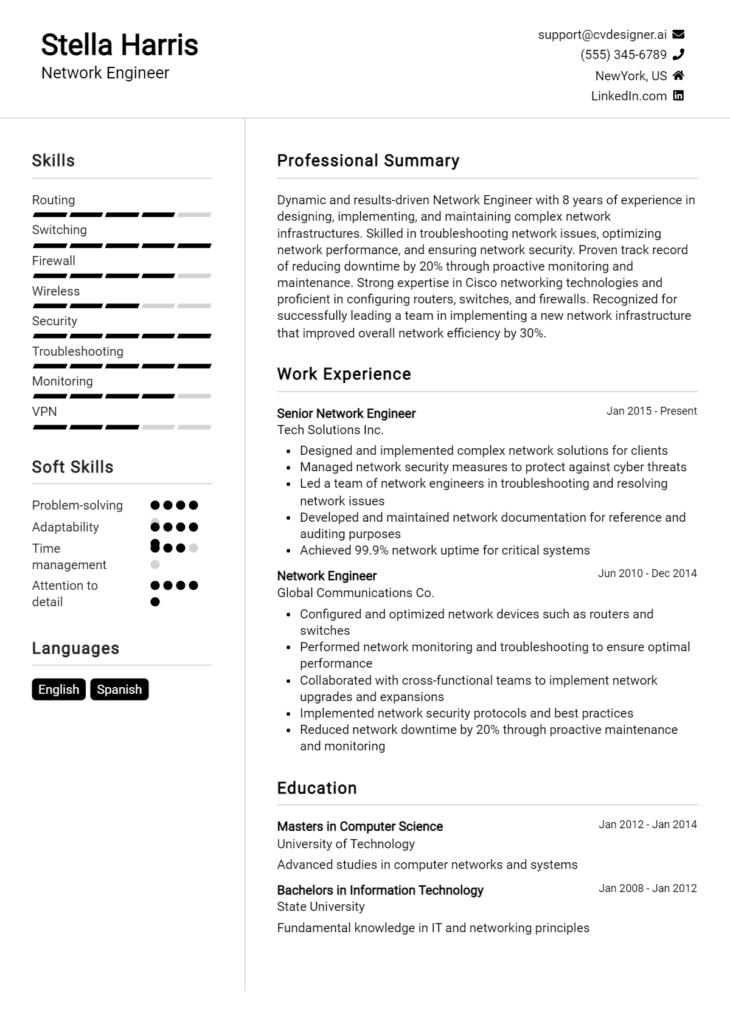Most Popular Senior Network Administrator Resume Examples
Explore additional Senior Network Administrator resume samples and guides and see what works for your level of experience or role.
As the backbone of any organization’s IT infrastructure, the role of a Senior Network Administrator is both critical and multifaceted. This position not only demands a deep understanding of network systems and protocols but also requires exceptional problem-solving skills and the ability to lead teams effectively. A well-crafted resume can be the key to showcasing your expertise and landing your dream job in this competitive field. In today's digital world, where technology is ever-evolving, having a standout resume that highlights your technical knowledge and leadership abilities is essential to differentiate yourself from the competition.
In this comprehensive resume writing guide for Senior Network Administrators, we will cover essential aspects to help you create a compelling resume. You will learn about the primary responsibilities and skills required for the role, ensuring your resume aligns with industry expectations. We'll discuss the best formats to use for maximum impact and highlight common mistakes to avoid that can undermine your application. Additionally, we will provide resume examples tailored for all experience levels, along with expert tips on effective resume writing practices. You will also discover how to select the right resume templates that resonate with your professional brand. Whether you’re just starting out or looking to advance your career, this guide is designed to equip you with the tools you need to succeed.
Key Responsibilities and Skills for a Senior Network Administrator
A Senior Network Administrator plays a crucial role in managing and optimizing an organization's network infrastructure. This position involves overseeing the design, implementation, and maintenance of network systems to ensure seamless connectivity and security. Key responsibilities typically include:
- Designing and implementing network configurations, including routing and switching.
- Monitoring network performance and troubleshooting issues to maintain optimal operation.
- Managing and securing network devices such as firewalls, routers, and switches.
- Ensuring compliance with industry standards and best practices for network security.
- Collaborating with IT teams to plan and deploy network upgrades and expansions.
- Conducting regular backups and disaster recovery testing to safeguard data integrity.
- Providing technical support and guidance to junior network staff and end-users.
- Keeping documentation up-to-date regarding network configurations and changes.
Essential skills for a Senior Network Administrator include:
- Proficiency in network protocols (TCP/IP, DNS, DHCP, etc.).
- Experience with network security measures and firewalls.
- Familiarity with network monitoring tools and performance optimization.
- Strong troubleshooting and problem-solving abilities.
- Knowledge of cloud networking and virtualization technologies.
- Excellent communication skills for collaborating with teams and stakeholders.
- Ability to manage multiple projects and prioritize tasks effectively.
Highlighting these skills effectively in the resume skills section is crucial for standing out to potential employers. Tailoring the responsibilities and skills listed to align with the specific job description can significantly increase the chances of landing an interview. Additionally, considering how these skills can be showcased in a strong CV will enhance the overall presentation of qualifications, making candidates more appealing to hiring managers. By demonstrating both technical expertise and relevant experience, a Senior Network Administrator can effectively position themselves as a valuable asset to any organization.
Best Resume Format and Structure for a Senior Network Administrator
When crafting a resume for a Senior Network Administrator position, it's essential to choose a format that highlights your technical expertise and relevant experience. The following guide outlines the best structure and key sections to include in your resume, ensuring it stands out to potential employers.
Contact Information
Start with your name prominently at the top of the resume, followed by your phone number, email address, and LinkedIn profile (if applicable). You may also include your location (city and state) but avoid full addresses for privacy reasons.
Professional Summary
A concise professional summary (3-4 sentences) at the beginning of your resume is crucial. This section should summarize your years of experience, key skills, and what you bring to the role. Tailor this summary to reflect your expertise in network administration, leadership capabilities, and any specialized technologies you are proficient in.
Work Experience
List your work history in reverse chronological order, starting with your most recent job. For each position, include the job title, company name, location, and dates of employment. Use bullet points to describe your responsibilities and achievements, focusing on quantifiable results (e.g., "Reduced network downtime by 30% through proactive monitoring and maintenance"). Highlight your experience with network design, implementation, troubleshooting, and security protocols.
Education
Include your highest degree first, followed by any relevant certifications. Specify the degree obtained, major, university name, and graduation date. If you have completed any specialized training in network administration or related fields, list those as well.
Skills
Create a section dedicated to your technical skills, ensuring that they are relevant to the Senior Network Administrator role. Include both hard skills (e.g., proficiency in Cisco, Juniper, network protocols, virtualization technologies) and soft skills (e.g., problem-solving, communication, teamwork). This section can be formatted as a bullet-point list for easy readability.
Certifications
List any industry-recognized certifications that bolster your qualifications, such as CCNA, CCNP, CompTIA Network+, or Certified Information Systems Security Professional (CISSP). Be sure to include the certification name and the date it was obtained. This section can be listed separately or integrated within the Education section, depending on how prominent you want it to appear.
Additional Tips
- Tailor Your Resume: Customize your resume for each job application, incorporating keywords from the job description to pass through Applicant Tracking Systems (ATS).
- Keep It Concise: Aim for a one-page resume if you have fewer than 10 years of experience; two pages are appropriate for more extensive careers.
- Use Professional Language: Maintain a formal tone and avoid slang. Be clear and direct in your descriptions.
- Formatting: Use a clean and professional layout with consistent font styles and sizes. Ensure there is ample white space for readability.
Complementing Your Cover Letter
The resume format should align with your cover letter format to create a cohesive application package. Use the same header, font, and style throughout both documents. Your cover letter should elaborate on key points from your resume, providing context and showcasing your personality and passion for the role. Aim for a professional tone and structure that mirrors the clarity and organization of your resume.
By following this structured approach, you can create a compelling resume that effectively communicates your qualifications and readiness for a Senior Network Administrator position.
Writing Tips and Best Practices for a Senior Network Administrator Resume
Crafting a compelling resume as a Senior Network Administrator requires a strategic approach that highlights your technical expertise and leadership experience. Start by ensuring your resume is well-organized and visually appealing, as a professional look can set you apart from other candidates. Use action verbs to convey your accomplishments, such as "managed," "implemented," or "optimized," which can demonstrate your proactive contributions to past employers. Quantifying your achievements with specific metrics can further illustrate your impact, whether it's through improved network uptime, reduced latency, or cost savings. Additionally, incorporating industry-specific keywords tailored to the job description can help your resume get past automated applicant tracking systems. Remember to leverage resume writing tips for polishing your document and consider how these practices can enhance your cover letter as well.
- Use clear headings and bullet points for easy readability.
- Start each bullet point with a strong action verb.
- Quantify achievements with numbers, percentages, or timeframes when possible.
- Tailor your resume to the specific job by including relevant keywords from the job posting.
- Highlight certifications and technical skills prominently, as these are critical in network administration roles.
- Include a summary statement that encapsulates your experience and core competencies.
- Focus on relevant experience, prioritizing recent roles and responsibilities.
- Ensure there are no grammatical errors or typos, as attention to detail is crucial in this field.
Common Mistakes to Avoid in a Senior Network Administrator Resume
When crafting a resume for a Senior Network Administrator position, it's essential to present your skills and experience effectively to stand out in a competitive job market. However, many candidates make common mistakes that can undermine their chances of securing an interview. To enhance your resume, it's crucial to focus on clarity, relevance, and professionalism. Below are several mistakes to avoid:
- Overloading the resume with excessive information that detracts from key qualifications.
- Using generic job descriptions that fail to convey specific achievements or responsibilities.
- Failing to tailor the resume to the specific job description and requirements.
- Neglecting to include relevant certifications and technical skills.
- Using passive language instead of strong action verbs to describe accomplishments.
- Including outdated or irrelevant work experience that doesn't pertain to the role.
- Misplacing contact information, making it difficult for recruiters to reach you.
- Ignoring the importance of formatting, leading to a cluttered and hard-to-read document.
- Overlooking spelling and grammatical errors, which can appear unprofessional.
- Not utilizing quantifiable metrics to demonstrate the impact of your contributions.
To enhance your chances of landing the job, consider reviewing the common mistakes to avoid in a resume. Additionally, don't overlook the significance of your cover letter; ensure you also avoid common cover letter mistakes to create a strong overall application.
Sample Senior Network Administrator Resumes
As organizations increasingly rely on complex networks to support their operations, the role of a Senior Network Administrator has become vital. This position demands a blend of technical expertise, problem-solving skills, and the ability to manage multiple tasks effectively. Below are three sample resumes tailored for different experience levels and career paths: an experienced professional, an entry-level candidate, and a career changer.
Sample Resume 1: Experienced Senior Network Administrator
John Smith
[City, State]
[Phone Number]
[Email Address]
Professional Summary
Detail-oriented Senior Network Administrator with over 10 years of experience in managing and securing enterprise-level networks. Proven track record in optimizing network performance, implementing security protocols, and leading cross-functional teams. Adept at troubleshooting complex issues and enhancing system efficiency.
Professional Experience
Senior Network Administrator
ABC Corp, [City, State]
[Month, Year] – Present
- Led a team of 5 network engineers to design and implement a scalable network infrastructure serving over 2000 users.
- Developed and enforced security policies resulting in a 30% reduction in security breaches over two years.
- Managed vendor relationships to optimize hardware and software procurement, achieving a 15% cost reduction.
Network Administrator
XYZ Inc., [City, State]
[Month, Year] – [Month, Year]
- Configured and maintained network devices including routers, switches, and firewalls for a multi-site organization.
- Conducted regular network audits and performance assessments, leading to a 25% improvement in system uptime.
- Collaborated with IT support teams to resolve network-related issues and provide seamless connectivity for end-users.
Education
Bachelor of Science in Information Technology
University of [Your University], [City, State]
[Year]
Certifications
- Cisco Certified Network Professional (CCNP)
- CompTIA Network+
- Certified Information Systems Security Professional (CISSP)
Sample Resume 2: Entry-Level Network Administrator
Emily Johnson
[City, State]
[Phone Number]
[Email Address]
Professional Summary
Motivated and detail-oriented recent graduate with a Bachelor’s degree in Information Technology and a strong foundational knowledge of network administration. Eager to apply theoretical knowledge in a practical environment and contribute to the efficiency of network operations.
Education
Bachelor of Science in Information Technology
University of [Your University], [City, State]
[Year]
- Relevant Coursework: Network Security, Systems Administration, and Network Design
Internship Experience
IT Intern
Tech Solutions Inc., [City, State]
[Month, Year] – [Month, Year]
- Assisted in configuring and troubleshooting network devices under the supervision of senior administrators.
- Contributed to network documentation and inventory management, improving asset tracking efficiency by 20%.
- Participated in daily stand-up meetings to discuss issues and progress on network projects.
Skills
- Basic understanding of TCP/IP, routing protocols, and network security principles.
- Familiar with Cisco routers and switches, as well as network monitoring tools.
- Strong problem-solving skills and ability to work in a team-oriented environment.
Sample Resume 3: Career Changer to Senior Network Administrator
Michael Brown
[City, State]
[Phone Number]
[Email Address]
Professional Summary
Dedicated IT professional with over 5 years of experience in technical support and system administration, now transitioning to a Senior Network Administrator role. Strong analytical skills with a passion for network design and optimization, seeking to leverage existing expertise in a new and challenging environment.
Professional Experience
System Administrator
Global Tech, [City, State]
[Month, Year] – Present
- Managed Windows and Linux servers, ensuring optimal performance and uptime for critical applications.
- Provided technical support to end-users, resolving issues related to network connectivity and hardware.
- Implemented backup and disaster recovery solutions, enhancing data security and availability.
Technical Support Specialist
Smart Solutions, [City, State]
[Month, Year] – [Month, Year]
- Assisted customers with technical issues, including network connectivity and software installation.
- Documented troubleshooting steps and developed knowledge base articles to improve team efficiency.
- Collaborated with engineering teams to address recurring network problems and improve service delivery.
Education
Bachelor of Science in Computer Science
University of [Your University], [City, State]
[Year]
Certifications
- CompTIA A+
- CompTIA Network+ (in progress)
- Cisco Certified Network Associate (CCNA) (in progress)
For more inspiration, explore a variety of resume templates that can help you craft your own standout application. Don't forget to complement your resume with tailored cover letter examples to create a comprehensive job application package.
Checklist for a Senior Network Administrator Resume
- Proofread for Errors: Carefully read through your resume to catch any spelling, grammar, or punctuation mistakes. Consider using tools like Grammarly for an extra layer of review.
- Check for Consistency: Ensure that your formatting is uniform throughout the document. This includes font types, sizes, bullet styles, and spacing.
- Tailor Your Resume: Customize your resume to align with the specific job description. Highlight relevant experiences and skills that match the requirements of the Senior Network Administrator position.
- Use Action Verbs: Start each bullet point with strong action verbs (e.g., designed, implemented, managed) to convey your accomplishments more effectively.
- Highlight Certifications: Make sure to prominently display any relevant certifications, such as CCNA, CCNP, or CompTIA Network+, as these are crucial for the role.
- Quantify Achievements: Where possible, include metrics to demonstrate your impact (e.g., “Reduced network downtime by 30% through proactive monitoring”).
- Include Relevant Skills: List key technical skills relevant to network administration, such as experience with firewalls, routers, switches, and network monitoring tools.
- Keep It Concise: Limit your resume to 1-2 pages. Focus on the most relevant experiences and avoid unnecessary details.
- Seek Feedback: Have a peer or mentor review your resume to provide constructive feedback and catch any overlooked errors.
- Consider Using an AI Resume Builder: Utilize an AI resume builder to ensure all elements are well-organized and visually appealing. A similar checklist can also be followed for creating a CV or cover letter.
Key Takeaways for a Senior Network Administrator Resume Guide
In conclusion, crafting a strong resume as a Senior Network Administrator is essential to stand out in a competitive job market. Utilize the examples and tips provided in this guide to highlight your technical expertise, project management experience, and problem-solving abilities effectively. As you begin to create your resume, consider downloading a template from resume templates or exploring our tailored cover letter templates to ensure your application materials are polished and professional. Additionally, our best resume maker can help streamline the process, making it easier for you to focus on showcasing your qualifications. Remember, following similar guidelines will also assist you in crafting a compelling CV and cover letter that resonates with potential employers. Take the next step in your career by putting these insights into action!
